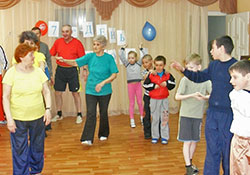Russian Federation

Zhuravleva Svetlana
On 7 April 2012, a conference focused on this year’s topic of health and ageing was jointly organized by the WHO Country Office in the Russian Federation and First Moscow Medical University named after I. Sechenov. Conference participants were welcomed in opening remarks by Dr L. Migliorini, WHO Special Representative in the Russian Federation, and Dr E. Skachkova, Deputy Head of Department, Ministry of Health.
The first speaker, Professor Tamara Maximova, presented results of the WHO SAGE study conducted in Russia in 2007-2010: “More than half of respondents are satisfied with their lives (60.9% of men and 54.4% of women) and declared their quality of life as moderate. Subjective well-being and quality of life was assessed using the WHO Quality of Life (WHOQoL) index, which ranges from 0 to 100. There was a tendency of scores to decrease with age and increase with educational status. According to the data only a quarter (24.8%) of the respondents has a normal nutritional status. The share of population aged 50+ with insufficient fruit and vegetable consumption is very high – 79.1% and it is even higher in rural areas.”
Prof. Maximova’s presentation was complemented by reports of leading Russian demographer Dr. A. Vishnevsky, Head of Clinical Centre of Gerontology V. Shabalin, and Mayor of the city of Izhevsk, Mr A.Ushakov.
Intergenerational support and understanding
This year’s slogan: “Good health adds life to years” was warmly embraced by governmental officials, public health professionals and the general population. Public events organized in the country gathered various generations and strengthened mutual understanding and support. In the city of Dimitrovgrad, students from the University for Older People visited kindergartens and schools to informally teach children and teenagers how to maintain good health in order to enjoy a healthy life. The University for Older People is one of the numerous initiatives designed and developed in the Healthy Cities Network to respond to demographic challenges facing the Russian Federation.
Another event, the “Healthy five” march, urged people of all ages to reach the distance of five kilometres. The march was initiated in Saint Petersburg and also supported in other Russian “Healthy Cities”, including rather remote locations such as Velikiy Ustiug, where weather conditions made outdoor activities more challenging.



